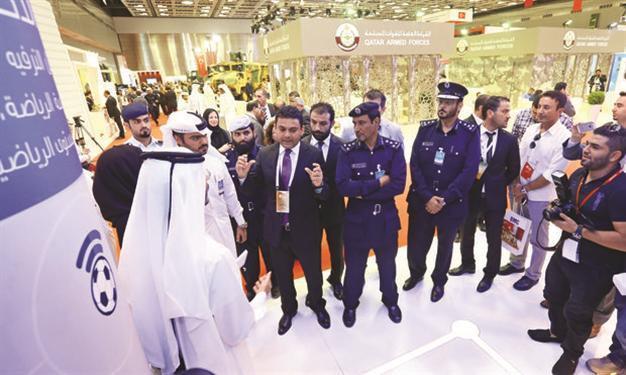Turkish watch, guidance at 2022 Qatar World Cup
Ali Kayalar - DOHA
 Doha, the Qatari capital getting ready to host a controversial 2022 World Cup, will be under close watch, with a giant surveillance system handed to the state by Proline, a Turkish developer, and Turkish-made boats guarding beaches.
Doha, the Qatari capital getting ready to host a controversial 2022 World Cup, will be under close watch, with a giant surveillance system handed to the state by Proline, a Turkish developer, and Turkish-made boats guarding beaches.The company executives have worked on the project for years in close cooperation with the Qatari Interior Ministry.
They said 200-kilometer-long fiber optic cables were laid across the city, connected to cameras, sensors and a command center for the “Taala” project, on the sidelines of High Tech Port by MÜSİAD Qatar.
The country of 2 million expects some half a million visitors during the 2022 event.
FIFA has confirmed that the 2022 World Cup final in Qatar will be played on Dec. 18. Thus, the final clash of the winter World Cup will take place a week before Christmas, while major European leagues are still ongoing.
Its date is not the only controversial component of the cup. Qatar has been under fire for the labor conditions of its foreign workers at its newly constructed World Cup stadiums.
Another Turkish step revealed at the bilateral defense fair at a venue under the shadow of the city’s first underground line, another ongoing World Cup project. Ares, the Turkish ship maker, will buy weapon systems from Aselsan, the maker of Turkish tactical military radios and defense electronic systems, for the 17 coast guard boats it sold to Qatar last year.
Antalya-based Ares will implement 300 mm and 12.7 mm remote-controlled and stabilized machine gun systems on the boats.
Ares chairman Kerim Kalafatoğlu said at least three of the boats will be delivered in 2016 and the whole project will be concluded in four years.
Aselsan General Manager Faik Eken told Anadolu Agency that the company has sold high-tech goods to 50 countries including the U.S., the Netherlands, Uruguay, Kazakhstan and Malaysia.
Minister praises offsets, reverse engineering
Turkey, suffering a large trade gap in defense sector, needs serious and industry-sector offsets to boost exports, according to Turkish Defense Minister Vecdi Gönül.
Turkey, bidding to nationalize many of its defense items, buys more than ten-fold of its $1.4 billion annual military exports from abroad.
“A 50 percent offset implementation may bring in 50 percent more business volume for business people,” the minister said during the one-time defense fair on Oct. 7.
However, Turkish companies should produce industrial products that can meet an offset demand, he said.
The ministry has boosted its annual research and development to 600 million Turkish Liras from 5 million liras, on President Recep Tayyip Erdoğan’s order, the minister said. He also added that joint projects or “reverse engineering,” could work, implying that Turkey could produce similar versions of developed technologies.
“Reverse engineering is the thing that China does most,” he said. “Even Japan does it.”
















